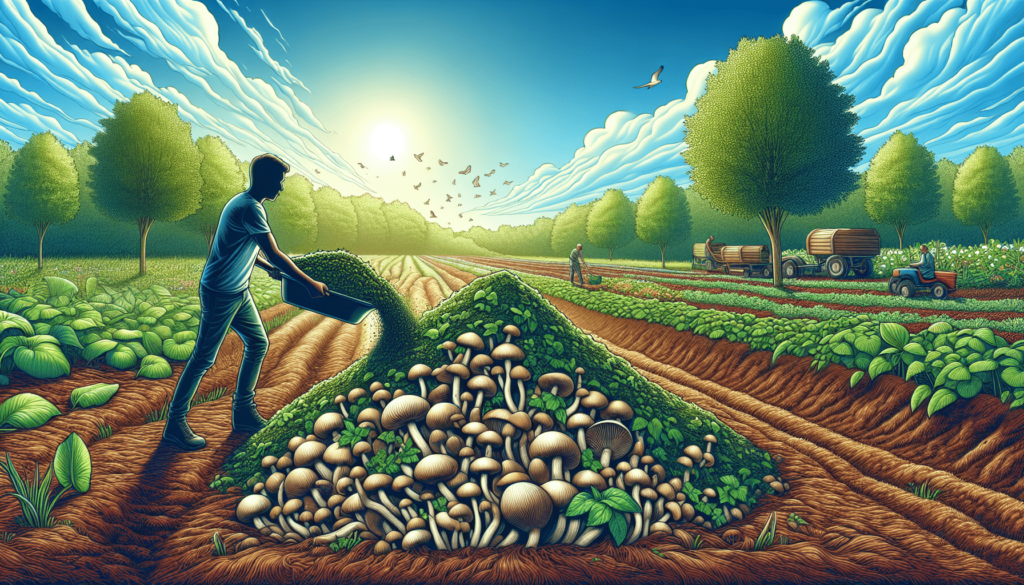Does Mushroom Compost Improve The Cation Exchange Capacity Of Soil?
Understanding Cation Exchange Capacity
Cation Exchange Capacity (CEC) is the soil’s ability to hold and exchange cations, which are positively charged ions. These cations include important nutrients for plant growth such as calcium (Ca2+), magnesium (Mg2+), and potassium (K+). A soil with high CEC can retain more nutrients and reduce leaching, making them more available for plant uptake.
What is Mushroom Compost?
Mushroom compost, also known as spent mushroom substrate, is a byproduct of the mushroom farming industry. It is made from a mixture of materials such as straw, peat moss, gypsum, and chicken manure used to grow mushrooms. After the mushrooms have been harvested, the leftover substrate is recycled into compost.

Learn about mushroom composting
The Nutrient Content of Mushroom Compost
Mushroom compost is rich in organic matter and nutrients essential for plant growth. It contains significant amounts of nitrogen (N), phosphorus (P), and potassium (K), as well as micronutrients like calcium (Ca), magnesium (Mg), and sulfur (S). These nutrients contribute to soil fertility and support healthy plant growth.
How Does Mushroom Compost Improve Soil Structure?
Mushroom compost has a high organic matter content, which helps improve soil structure by increasing soil aggregation and pore space. This allows for better root penetration, water infiltration, and air circulation in the soil. The organic matter in mushroom compost also serves as a food source for soil microbes, promoting their growth and activity.

The Impact of Mushroom Compost on Soil pH
Mushroom compost has a neutral to slightly alkaline pH, which can help buffer acidic soils and prevent rapid fluctuations in soil pH. By adding mushroom compost to acidic soils, you can gradually raise the pH towards a more neutral level, creating a more favorable environment for plant growth.
Testing Mushroom Compost for Cation Exchange Capacity
To determine if mushroom compost can improve the CEC of soil, you can conduct a simple test using a soil testing kit. Mix a small amount of mushroom compost with soil and water, then measure the pH and nutrient levels of the mixture. Compare these results with those of the soil alone to see if there is an increase in nutrient availability and CEC.

Results of Studies on Mushroom Compost and Cation Exchange Capacity
Several studies have shown that incorporating mushroom compost into soil can increase the CEC and nutrient holding capacity of soil. The organic matter and nutrients in mushroom compost can enhance soil fertility and promote healthy plant growth. By improving the CEC of soil, mushroom compost can help reduce nutrient leaching and improve nutrient availability to plants.
Using Mushroom Compost to Improve Soil Fertility
If you are looking to improve the fertility of your soil and enhance plant growth, incorporating mushroom compost into your soil amendment regimen can be beneficial. The organic matter and nutrients in mushroom compost can replenish soil nutrients, improve soil structure, and promote beneficial microbial activity. By increasing the soil’s CEC, mushroom compost can help retain nutrients and support plant growth over the long term.

Best Practices for Applying Mushroom Compost to Soil
When applying mushroom compost to your soil, it is important to follow best practices to maximize its effectiveness. Mix the compost thoroughly into the soil to ensure even distribution of nutrients and organic matter. Avoid applying excessive amounts of compost, as this can lead to nutrient imbalances and potential nutrient runoff. Monitor soil pH and nutrient levels regularly to adjust your application rates accordingly.
Benefits of Mushroom Compost Beyond Cation Exchange Capacity
In addition to improving the CEC of soil, mushroom compost offers a range of additional benefits for soil health and plant growth. Its rich organic matter content can improve soil structure, water retention, and aeration. The nutrients in mushroom compost can support plant growth and contribute to healthier, more productive crops. By incorporating mushroom compost into your gardening or farming practices, you can reap the benefits of a more fertile and resilient soil ecosystem.

Conclusion
In conclusion, mushroom compost has the potential to improve the cation exchange capacity of soil by increasing nutrient availability and enhancing soil fertility. By incorporating mushroom compost into your soil amendment routine, you can promote healthy plant growth, reduce nutrient leaching, and create a more sustainable growing environment. Consider testing mushroom compost in your soil and monitoring its impact on nutrient levels and plant performance to optimize its benefits. Remember, healthy soil is the foundation for successful gardening and farming practices, and mushroom compost can be a valuable ally in achieving your soil fertility goals.

